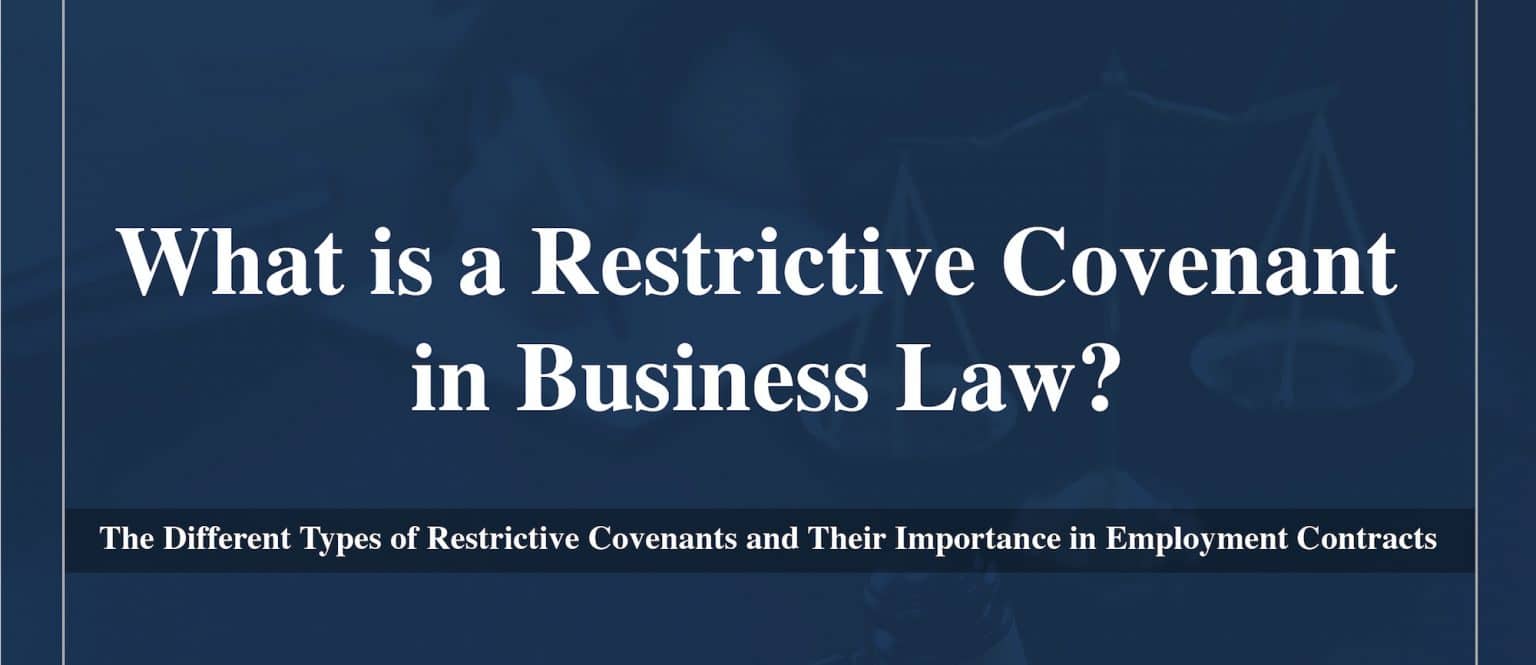
The Different Types of Restrictive Covenants and Their Importance in Employment Contracts
I. What Is a Restrictive Covenant in Business Law?

Every business has integral and invaluable information vital to its success. That is why in order to protect the business, it is essential to restrict the use of important information by employees, especially when they are no longer part of the business. A good reason for this restriction is that an ex-employee can be an attractive asset to competitors since they are aware of the company’s strategic information, technology, and customers/clients. Employers can protect themselves and their business with the use of restrictive covenants.
The term “covenant” came from the Latin word convenire which means “agree, be suitable; unite, come together.” So technically speaking, a covenant is an agreement between parties. However, restrictive covenants have the potential for restraint of trade which puts such agreements under scrutiny.
While restrictive covenants are not illegal per se, restrictions associated with them can limit an individual’s ability to do business. These clauses within contracts prohibit an individual from competing for a period of time with a business they were previously a part of or prevent an ex-employee from soliciting or dealing with their former employer’s clients/customers using the knowledge they acquired during their employment.
II. Types of Restrictive Covenants
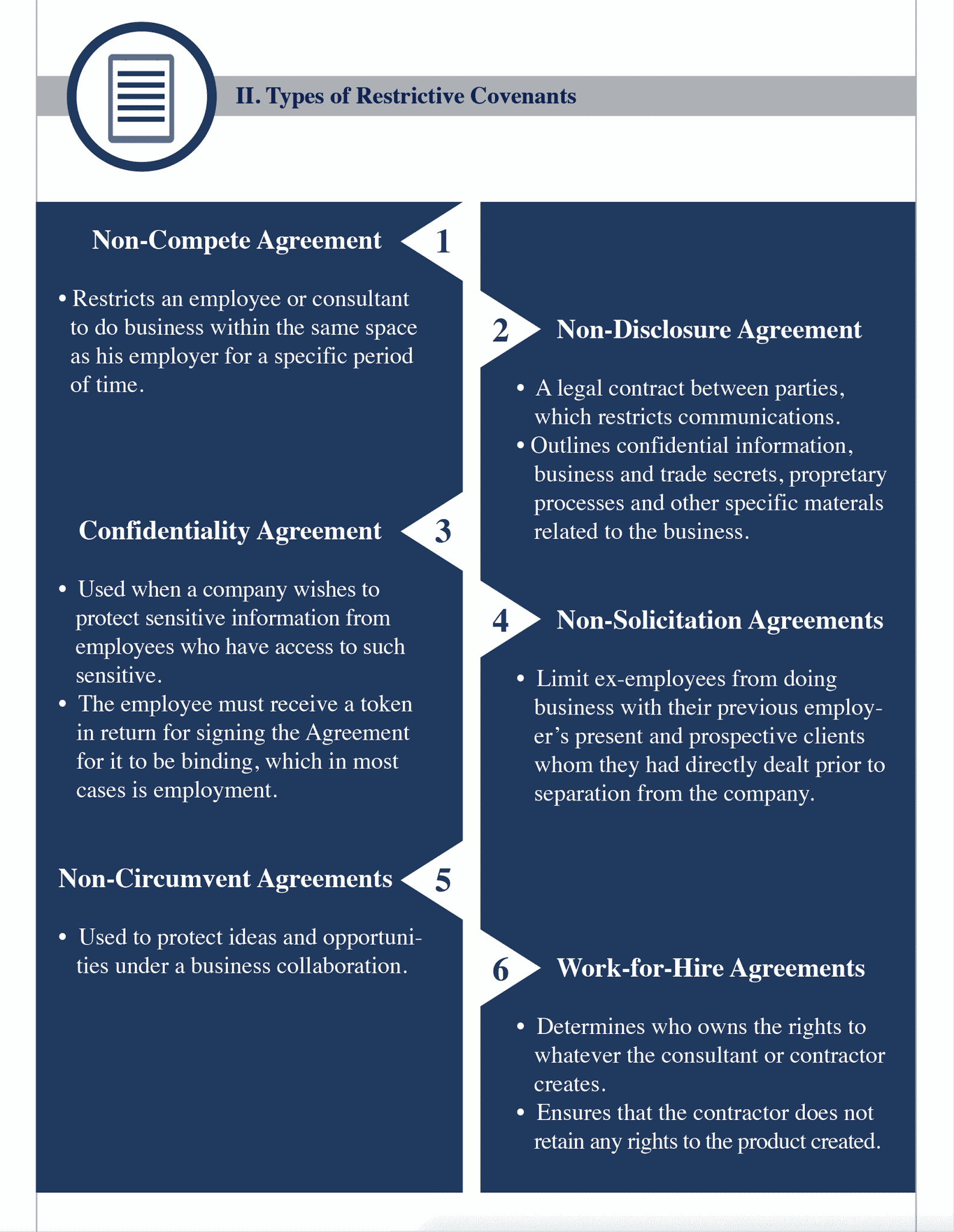
There are a variety of covenants that can protect a business, and each has its unique purpose. While the names are used interchangeably, it is critical for an agreement used to fit the given situation.
Here are the types of restrictive covenants used within an agreement or contract and their respective purposes:
-
Non-Compete Agreement
A non-compete agreement is probably the most common type of restrictive covenant in an employment agreement. This clause restricts an employee or consultant from doing business within the same space as their employer for a specific period of time.
Non-compete agreements are used under the assumption that an employee might work for a competitor or start a business of their own upon termination or resignation. Utilizing confidential information such as their former employer’s operations or trade secrets, business practices, marketing plans, and upcoming products will help them gain a competitive advantage.
Courts point out that non-compete agreements should be analyzed on a case-by-case basis, making it difficult to determine their reasonableness or enforceability. In Florida, the law does not favor such agreements. However, these agreements can still be enforced under the following conditions:
- They are considered reasonable in terms of geographic proximity
- They serve a legitimate business interest
- They are reasonable in time
This clause can be an effective tool to limit the ability of an ex-employee to directly compete, especially after acquiring substantial training and experience at their employer’s expense. However, over-reaching agreements will not be enforced. For this reason, businesses should consider using other forms of restrictive covenants as alternatives or supplements.
-
Non-Disclosure Agreement
Commonly referred to as NDA, a non-disclosure agreement is a legal contract between parties that restricts communications. It outlines confidential information, business and trade secrets, proprietary processes, and other specific materials related to the business to be shared between parties while restricting access to uninvolved individuals. In essence, NDAs protect non-public business information.
An NDA creates a confidentiality relationship between involved parties to protect any type of confidential and proprietary information or trade secrets the business has. NDAs are commonly signed when two parties are considering doing business and need to understand each other’s business processes.
NDAs can be mutual, restricting both parties in their use of materials, or one-sided, where one party restricts the other. Additionally, an employee may sign an NDA or NDA-like agreement with their employer. There are employment contracts that include a clause restricting an employee’s use and distribution of confidential and proprietary company information.
For an NDA to be enforceable, it must include confidential and invaluable information to protect.
-
Confidentiality Agreement
Confidentiality agreements are used when a company wishes to protect sensitive information from employees who have access to such data or need to see the information to complete their tasks. For a confidentiality agreement to be legally binding, the employee must receive something in return for signing it, which is typically employment. This agreement will be effective for the duration of the employee’s tenure up to a period of time following their separation from the business.
-
Non-Solicitation Agreements
Non-solicitation agreements are similar to non-compete agreements but only limit rather than completely prohibit competition. These clauses restrict activities such as marketing and hiring current employees or vendors. Additionally, non-solicitation agreements limit ex-employees from doing business with their previous employer’s current and prospective clients whom they had directly dealt with prior to separation from the company.
Courts prefer non-solicitation clauses over non-competition clauses in some cases, as a non-solicitation clause can be sufficient to protect the employer’s interests. For a non-solicitation agreement to be enforceable, it should be clear and unambiguous.
However, there are some common issues surrounding non-solicitation agreements:
- They can be considered a restraint of trade if they are unreasonable.
- Some state laws limit restrictive covenants like non-solicitation agreements.
- A company cannot prevent an employee who wants to leave to join another company.
- It is difficult to prove solicitation as there are instances where the client/customer seeks the former employee on their own accord.
-
Non-Circumvent Agreements
Non-circumvent agreements are used to protect ideas and opportunities under a business collaboration. These clauses prevent a business from being taken advantage of or bypassed during special contractual agreements with other businesses in the same field.
Say party A subcontracts party B in order to fulfill a delivery for party C. In this scenario, the non-circumvent agreement prevents party B from directly dealing with party C to offer the same products for a lower fee arrangement.
This legal document ensures that the identity of the introducing party’s contacts will remain confidential and that the other party will not directly engage with the ultimate customer. In the event of a violation, the violating party will have penalty fees. These fees can go as much as triple the amount of the original contract.
-
Work-for-Hire Agreements
These specialized provisions best suit businesses which plan to hire an independent or temporary contractor. Work-for-hire agreements protect both the business and the contractor’s interests. In addition, they ensure full grasp of the project scope and what the contractor needs to deliver.
In general, anyone who has contributed to any project has the right to sell the same exact product without anyone’s permission. Under the copyright law, the author has the claim over the copyright to any works he creates. However, a work-for-hire agreement determines who owns the rights to whatever the consultant or contractor creates. It ensures that the contractor does not retain any rights to the product created. Without a work-for-hire agreement, the creator still has the claim to ultimate ownership of the product even if it was already paid.
It is a wise move to have a work-for-hire agreement ready before starting any project with an independent contractor. It not only protects the interests of both parties but also ensures mutual understanding. A work-for-hire agreement may include the following:
- Project timeline
- Detailed work schedule
- Project milestones
- Terms of payment
III. Restrictive Covenants in Employment Contracts

Since employers laboriously worked for their business, it is only natural for them to want to minimize any danger an employee may expose the business to once they are no longer part of it. Probably the most common method to prevent any unfortunate event fall on your business is by imposing post-employment covenants or restrictive covenants.
Restrictive covenants, as the name suggests, are included in employment contracts to restrict current and former employees to engage in certain commercial activities. These clauses are often used with employees who have access to confidential company information or those who have valuable relationships with their fellow employees as well as the business’ customers and suppliers.
Are Restrictive Covenants Enforceable?
Employers protect their businesses with such restrictions to prevent former employees from using the knowledge and information they have acquired at the workplace. However, these restrictions are a clear violation of an individual’s freedom to contract and do business. That is why restrictive covenants are considered void and unenforceable against former employees unless the employer can demonstrate the following:
- The covenant was designed to protect a legitimate interest such as trade secrets, customer/client base, or the business’ workforce.
- The covenant does not go overboard and stick to what is necessary to protect that interest.
Therefore, it is extremely important for an employer to carefully draft restrictive covenants within employment contracts to repel any challenges by a court. Additionally, businesses should steer away from the temptations of using standard form covenants in every employment contract. The gravity of restrictions in employment contracts depend on the employees’ positions as the severity of the damage posed by a departing senior level employee is different from the damage a rank-and-file employee may inflict. Simply put, restrictions should be individually tailored and specific per employee.
While the inclusion of the full range of restrictions into an employment contract may have a restraining effect, there is no guarantee that they would be effective. So, employers should think hard as to which among the restrictive covenants do they need in order to protect their interests.
IV. Tips for Effective Drafting and Enforcement of Restrictive Covenants
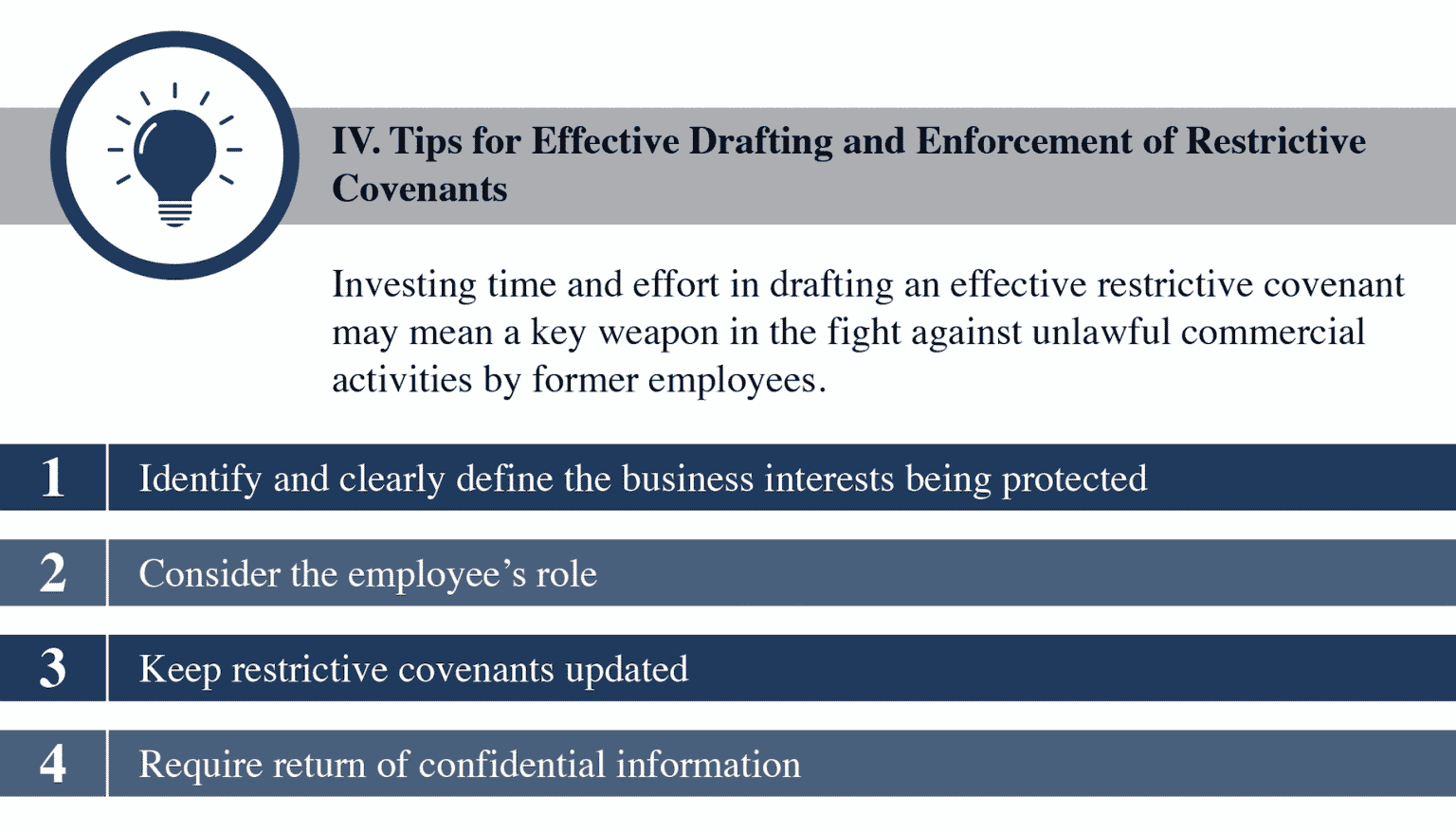
Drafting restrictive covenants have always been a challenge. However, investing time and effort in drafting an effective restrictive covenant may mean a key weapon in the fight against unlawful commercial activities by former employees.
Like any good legal drafting, drafting a restrictive covenant requires the same thoughtfulness and simplicity. The draftsman must take note of the delicate balance between protecting legitimate business interests without going further than what is reasonably necessary. The main goal is to restrict competitive activities to the maximum extent possible without jeopardizing the prospects of enforceability. Here are some pointers for drafting and enforcing restrictive covenants.
-
Identify and clearly define the business interests being protected
For restrictive covenants to be enforceable, employers must prove that such covenants do not go further than is reasonably necessary in order to protect legitimate business interests. So, it is best to identify what provisions are included in the covenant. These provisions may include protecting the company’s trade secrets and confidential information, or preserving key customers relationships, or restricting an employee’s commercial activities that may compete with the business. The covenant should also clearly define “competing” activities, products or services that may cause harm to the business, and the level of the employee’s involvement with each area.
Detailing such information will enable business owners to rebut any allegations that these covenants go beyond what is reasonably necessary.
-
Avoid broad geographic restrictions
Identify the geographic location of where the business is carried out and where the employee works. Adding an overly protective restriction on the area in which the departing employee may operate a business is one of the most critical errors done when drafting a restrictive covenant. Keep in mind that a restrictive covenant must be reasonable when it comes to the geographic area.
However, there is uncertainty attached to geographic limitations as it depends on the nature of the specific business involved. For example, a small business may restrict an area as small as a few miles while a large corporation can span the whole continent. By focusing on protecting confidential information and trade secrets, the covenant is more likely to be enforceable and withstand any challenge.
-
Carefully assess the period of restriction
For how long is it reasonable to restrict the former party of their activities with regards to their conduct towards the company’s clients and employees as well as handling confidential information? Assuming that the longer the restriction is, the stronger it is, may actually endanger the business. This is because if a covenant is regarded as too long, then it will be deemed as unenforceable.
When it comes to restricting the former party’s engagement with current clients and staff, the duration and the nature of the relationship are critical factors to determine the reasonable duration of the restriction. In the case of protecting confidential information, the focus shifts to the type of information that you want to protect. The longer the information remains confidential before being unusable or part of the public domain, the longer the restrictive period may be reasonable. The length of the restriction can be measured appropriately to protect the agreement from collateral attack by examining the relationship between the other party and client/staff and identifying the information being protected.
-
Consider the employee’s role
Since the level of engagement and knowledge of a senior level employee differs from that in a lower position, restrictive covenants must be tailored to the employee’s particular role. Consider their responsibilities, seniority, skills, experience, and their relationship with key parties including clients, suppliers and distributors as well as acquired specialist knowledge. Tailoring the covenant to suit the employee’s particular role will likely improve the enforceability of the agreement.
-
Keep restrictive covenants updated
When an employee gets promoted or the business’ focus changes, the restrictive covenant as detailed in their employment contract must be revisited and updated if necessary. If revised covenants are included in an employment contract, employers must provide adequate consideration for the employee entering these new covenants. Such considerations include a pay rise, flexible working hours, a bonus, or offering of shares.
-
Make sure that the agreement contains proper considerations
Since a restrictive covenant is basically a contract, it must have adequate consideration in order to be enforceable. An employment agreement is the most common form of consideration. However, not every state accepts this concept of employment as consideration. To avoid any challenges to the enforceability of the agreement, employers must be aware of the state laws they are drafting the agreement in if it accepts handling of employment as consideration.
-
Require return of confidential information
Employment contracts should require employees to surrender any documents or information in relation to the company after their separation. To further protect the business, businesses should also check for cover copies, derivations of company documents, and information contained on electronic devices.
-
Include choice of law and venue provisions
Instead of choosing the law and venue provisions of the state where the business is incorporated or headquartered, it is better to tie the choice of law and venue to the state where the employee works or resides. Additionally, since every jurisdiction treats restrictive covenants in a different manner, it is best to be familiar with the procedural and substantive law of the jurisdiction that they choose to follow.
-
Include an obligation in the employee’s contract to give a copy of their restrictive covenant to a prospective employer
In the event that the covenant was violated, employers may be able to sue the former employee or their prospective employer for damages or for breaching the contract. Employers may also be entitled to seek an injunction to prevent both parties from working with each other.
-
Do not underestimate the value of a well-drafted restrictive covenant
-
- While restrictive covenants may seem costly and time-consuming, having a well-drafted one may prove invaluable to the business if ever employers are put in an unfortunate position of enforcing them. Using a standard agreement for every employee is risky and highly inadvisable. Seeking legal advice while doing so would be beneficial for you in the long run.
V. Restrictive Covenant Tips for Employees

Many employees tend to overlook what they are signing which may lead to not fully understanding the legal consequences of a contract with restrictive covenants. Here are some things to take into consideration before entering such agreements and what they could mean upon separation from the company.
-
Understand the scope and application of the restrictive covenant in employment contract before signing it
Understanding the defined terms of an employment contract is vital upon termination. It is important to know which parties are defined as “customers,” what “competitive services” are, and for how long an employee is restricted from working for these parties or performing such services. Additionally, it is necessary to understand the extent of social media use or connections as stated in the restrictive covenant. For example, regarding someone as a “personal” contact can be considered as a “business” contact and may belong to the business, even if they were brought to the business by the employee.
-
Employees should be cognizant of their disclosure obligations
Many employment contracts, regardless of role, include clauses obliging an employee to notify their former employer when a competitor expressed the desire to hire them. Failure to do so may mean a breach of contract at the employee’s end. This clause is debatable as an employee is entitled to look for a job or be offered one. That’s why it is important for employees to be aware of any contractual obligations included in their employment contract and up to what extent.
-
Beware of electronic communications
Employees are required to return their company-issued electronic device, and employers may choose to review the calls, emails and other correspondence. Employees are also required to disclose any documents that they possess or have control of, regardless of whether those documents can support the employee’s claim to support their case or undermine it.
-
Consider seeking reimbursement from prospective employers
Employees should consider negotiating a repayment from their prospective employer for legal costs and financial losses that may incur upon their separation from their current employer. However, employees should be aware that any indemnity in respect of legal costs may translate to the admission of breach of the employee’s restrictive covenants or their employment contracts as a whole.
-
Employees should be mindful of possible breaches of their contract by their employers
If an employer has breached the contract in a way, then it may mean the dismissal of the restrictive covenants in the employee’s employment contract. This means that the employee is free to deal with or work for any employers as well as perform any commercial activities upon termination of employment. However, it is advisable for employees to seek legal advice to prove that their employer has indeed breached the contract.
-
Determine if the consideration offered are worthwhile
When entering restrictive covenants during the course of employment, employees should carefully gauge the offered consideration if it adequately compensates their level of responsibilities and abilities. They can try to negotiate the consideration that they will receive as they see fit. However, they should be careful when accepting any presented covenants. When an employee has decided to leave or has submitted their notice of resignation, then agreeing to enter into tighter restrictive covenants should be considered.
-
Seek legal advice
If the employee is concerned about securing another job after separation from the company, it is advisable to seek legal advice prior to termination of employment. Depending on the circumstances, a meeting with the employer to discuss the extent of their post-termination obligations may be necessary. Negotiating a shorter period of restriction may be possible depending upon the protected business interests.
VI. Restrictive Covenants in Florida Law
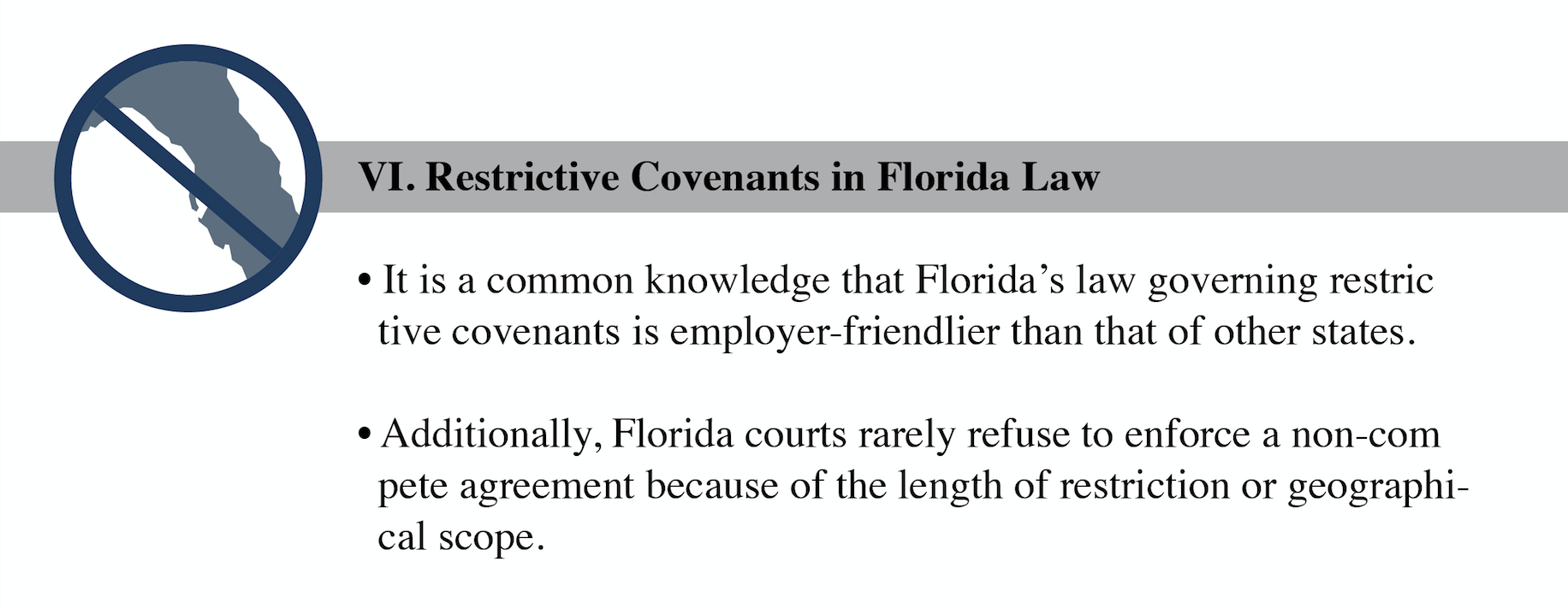
- Trade secrets, as defined in s. 002.
- Valuable confidential business or professional information that otherwise does not qualify as trade secrets.
- Substantial relationships with specific prospective or existing customers, patients, or clients.
- Customer, patient, or client goodwill associated with:
- An ongoing business or professional practice, by way of trade name, trademark, service mark, or “trade dress”;
- A specific geographic location; or
- A specific marketing or trade area.
- Extraordinary or specialized training.It is a common knowledge that Florida’s law governing restrictive covenants is employer-friendlier than that of other states. Additionally, Florida courts rarely refuse to enforce a non-compete agreement because of the length of restriction or geographical scope. The Florida law requires courts to “blue pencil” an impermissible scope or length of such agreements to make it reasonable and within the limits of the statute.In order to justify the restrictive covenant, the business shall prove the existence of legitimate business interests. The statute states that any restrictive covenant not supported by legitimate business interests is unlawful, and is void and unenforceable. Legitimate business interests may include, but are not limited to:
- In order to justify the restriction, the contractually specified restraint should be proven as reasonably necessary to protect legitimate business interests. If the restrictive covenant goes beyond what is reasonable, then a court shall modify the restraint and grant only what is reasonably necessary.
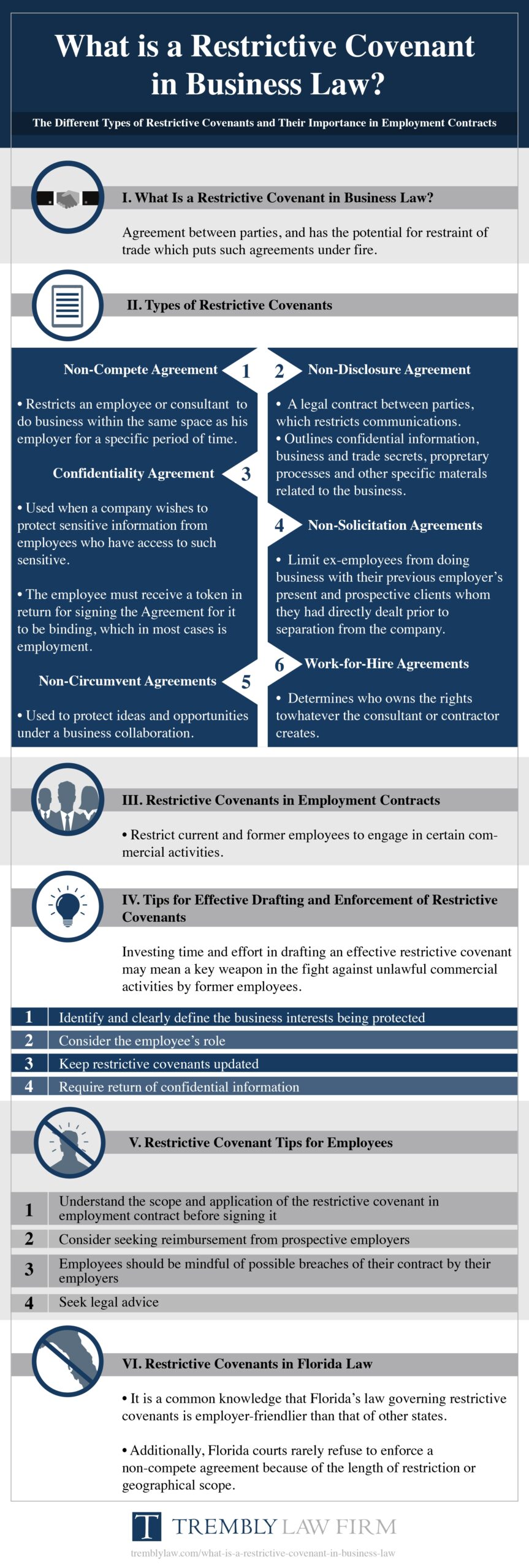
Follow Us on Social Media
